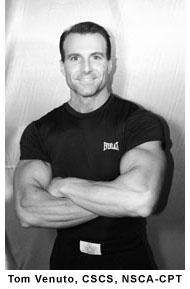Tom Venuto’s “Burn The Fat, Feed The Muscle Audio Program”.
|
Tom is extremely dedicated to telling you the truth, and giving you real strategies that work to help you achieve your goals easier, faster, with less confusion and frustration.
You're about to gain access to a very rare 4 part audio tele-class interview I did with Tom a few months ago. In which Tom completely over-delivered. And gave you step-by-step strategies you can use to start burning fat, gaining muscle, and see REAL results very quickly.
PS. Even if you've got Tom's eBook already, "Burn The Fat, Feed The Muscle" - I urge you to listen to these interviews, as Tom revealed some things which you won't find in his book!
|

Since 1989, Tom Venuto has been involved in the fitness industry as a personal trainer, success coach, nutrition consultant, health club manager, publisher and freelance writer.
|
Click Here to get more info about his powerful "Burn The Fat, Feed The Muscle" audio package.
Whey Protein Isolate or Whey Protein Concentrate; which is better?
By Tom Venuto - Author of Burn The Fat, Feed The Muscle
I’m really confused about all the different types of proteins. Can you tell me what is the difference between whey protein isolate and whey protein concentrate?
Before I explain the difference between the two types of whey, you first need to understand something very important: Much of the information being provided about protein comes from companies that sell supplements. The next time you read an article about protein supplements, keep in mind who is writing the article. Don’t be surprised if you get a sales pitch at the end of the article with an 800-number for easy ordering.
If a bodybuilder ever recommends a particular brand of protein, or makes outrageous claims like, "I gained 15 pounds of solid muscle just by switching to brand X protein", check to see if they have an endorsement contract. I have to laugh when I read that a bodybuilding champion claims to have built their physique by eating 50-80% of their calories in the form of protein powder, while they have a contract with the company that makes it. If anybody is really gung-ho about a particular type of protein, look for the bias – it’s almost always there.
That being said, it’s true that whey is definitely a great source of protein. Whey has a high biological value (BV). A high BV means that the amino acid ratio is excellent for building muscle and that a large proportion of the protein consumed is absorbed and utilized by the body. In addition, numerous studies from reputable researchers have shown that whey has immune-system enhancing benefits.
Whey is a dairy protein that is a by-product of the cheese making process. In its raw state, whey contains substantial amounts of fat and lactose (milk sugar). You wouldn’t want to eat raw whey. That’s why it is filtered and processed: to remove most of the lactose and fat. If you’ve ever heard of microfiltration or "ion exchange," those are simply methods of separating the fat and lactose from the protein. The end result is a more concentrated protein – either concentrate or isolate (which is what you want).
The primary difference between isolate and concentrate is that the isolate is more pure. In other words, isolate contains more protein with less fat and lactose per serving. Based on whose figures you go by, whey isolate usually contains between 90-94% protein while whey concentrate has a protein ratio of 70-85%.
If you are lactose intolerant and you have problems with gas and bloating, then the isolate might be a better choice. But being more "pure" doesn’t necessarily mean tht whey isolate is better or will produce greater muscle growth. Whey protein concentrate is still an excellent source of protein. Besides, isolate does have disadvantages: For one, it is more expensive than concentrate. Isolate has also had some of the valuable immune-boosting protein subfractions such as alpha lactoglobulins and lactoferrins removed in the filtering process.
In the long run, I don’t think it makes much difference whether you use concentrate or isolate. Nutrition companies will surely bicker back and forth forever over whose protein powder is the best, but choosing your protein isn’t something you should lose sleep over.
Protein nutrition is very simple: For practical muscle-building purposes, the important thing is to consume between 25-50 grams of protein (depending on your needs) every three hours. Whether it comes from whey isolate, whey concentrate, egg whites, chicken, fish, lean red meat or whatever – I just don’t think it matters that much.
I’ve used whey for years; I throw a couple scoops in my oatmeal in the morning sometimes instead of making egg whites. Sometimes I have a protein shake instead of a food meal. The main benefit of protein powders and meal replacements is convenience. Drinking your protein is definitely easier than preparing, cooking and eating it. Still, 80% of my protein comes from food sources such as egg whites, chicken, lean red meat (usually top round), and occasionally some tuna, salmon or other fish.

Tom Venuto is a lifetime natural bodybuilder, personal trainer,
gym owner, freelance writer, and author of “Burn The Fat, Feed
The Muscle”: Fat Burning Secrets of the World’s Best Bodybuilders
and Fitness Models. Click here to visit Tom's Burn The Fat, Feed The Muscle website.
|

